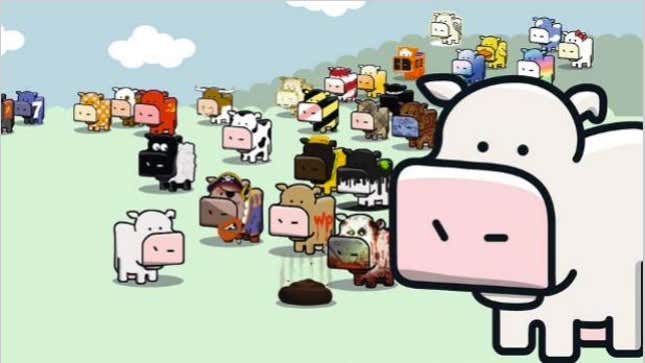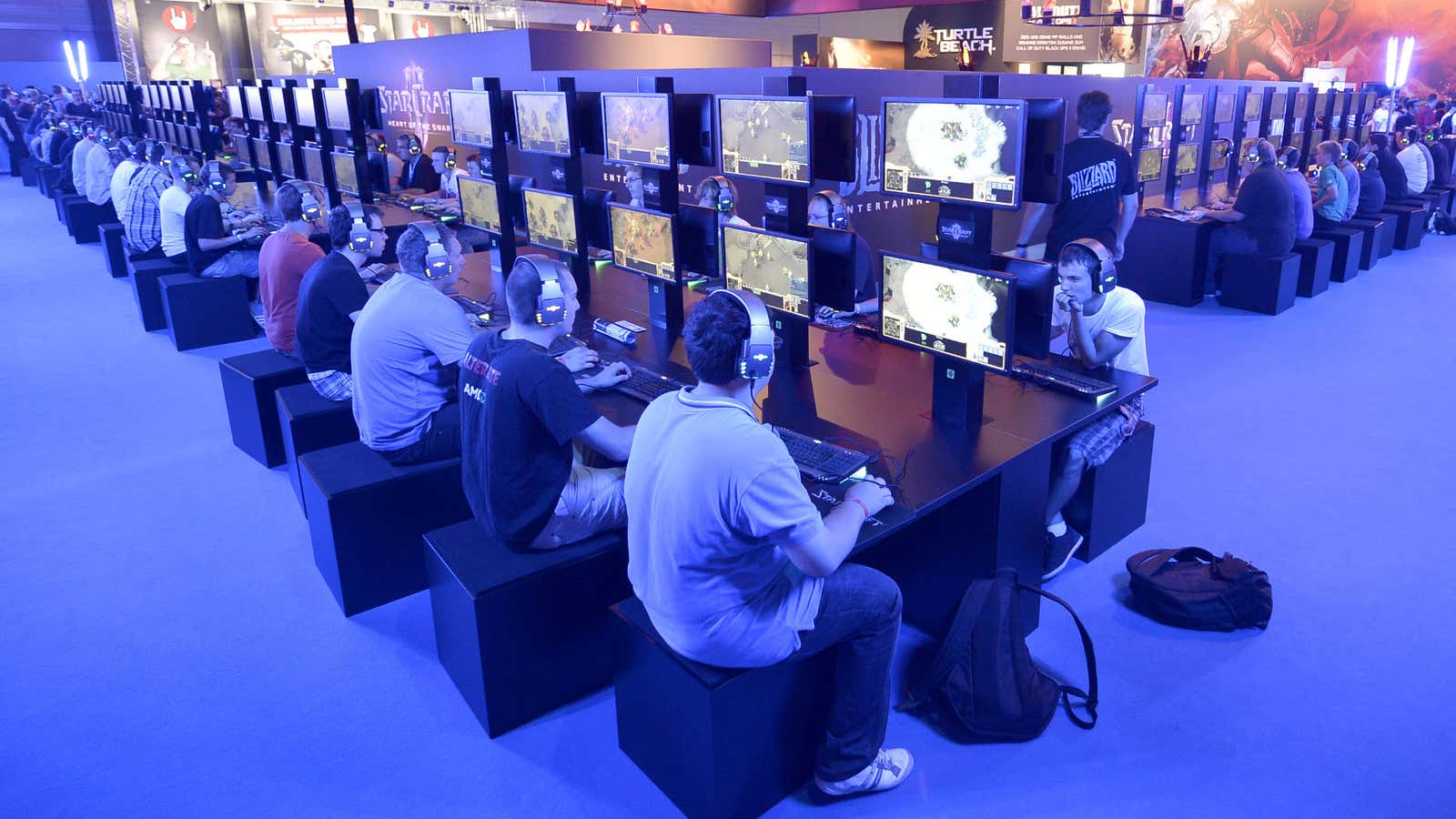A mindless game called Curiosity, the brainchild of the former creative director of Microsoft Game Studios Peter Molyneux, debuted early last month. This is a free app for iOS and Android users to deconstruct a giant cube that holds an even bigger secret, only to be revealed to the first person to reach the center. And to get there, you just tap on your screen. It’s been exactly a month since launch, and we’re still tapping. And tapping. Nobody knows what this prize is.
I really want to win.
Curiosity is just the latest in a series of social experiments that rely on user interactions with seemingly no point. Of course, Zynga is the king of this phenomenon, providing games full of sticky and addictive action that encourage more clicks for the sake of clicks. Arbitrary value becomes real value, even when it’s not meant to. Just ask Ian Bogost, who created the satirical social game Cow Clicker that went on to such absurd popularity that he felt compelled to continue developing it, trapping himself in an ironic loop that refuses to end. In Cow Clicker, you literally click one cow every six hours to collect Mooney, which lets you buy other cows to click on.

Mindless games will always exist so long as they provide entertainment to their users. But we’ve entered an age where the dynamics of those games can be applied elsewhere in our lives, and are done so without us even knowing. Gaming dynamics, which according to Bunchball founder and chief product officer Rajat Paharia, include drivers such as “measure and motivate,” “reward and recognition,” “loyalty,” “reputation,” and “guiding and amplifying high value behavior,” are here to motivate people to finish an end goal, theirs or others.
Think of a classroom or an office. James Vincent explains these systems best: “Both environments were thought of as ripe for adaptation: they already included features such as a roster of players (students or workers), a series of challenges (tests or work-assessments), and tiered reward systems (grades or salaries).”
The psychological tricks that games use today go deep down to the core of the human consciousness. In terms a laymen (like me) can understand: our brain’s pleasure center releases dopamine while we play, which makes it a rewarding experience. Combine these dynamics and their end goals with legacy institutions and we have a very appealing future.
To put things in perspective, the gamification industry earned $200 million in 2011 and is expected to earn more than $2.8 billion by 2016, led by companies like Bunchball and Badgeville. They boast clients straight off the Fortune 500: Microsoft, Oracle, Dell, Adobe, Hasbro, Cisco, Toyota, Intel, Ford, ESPN, Playboy, and Marriott.
So it’s hardly pointless. Gaming is already affecting behaviors if we only would see ourselves as players: Cars can convince you to drive more efficiently to save you money on gas and save gas for the environment (Ford Hybrid Cars); students can gain experience points in class instead of grades (Classrealm); and Nintendo can give you the tools and motivation to lose weight (Wii Fit).
My real fear is that the world in which games are imagined is too good to be true. Tony Ventrice is a senior game designer at Badgeville, a company that takes game techniques and implements them into other organizations to help guide user behavior. One of his main concerns is over who will control these systems:
The simple example is grades. You’re trying to stop failure. Everyone is beginning the year with an A. You’re trying to prevent yourself from dipping down, deviating from perfect. The level up system reverses this. Everyone starts at the bottom and then moves up. I don’t think this works because the teacher needs to know every point aspect.
Though Ventrice is a huge advocate of the game industry—it’s his meal ticket—he understands that it needs to be done properly. He explains gamification as “taking existing experiences and trying to make them more engaging.”
Certainly this is an admirable goal. His company provides the tools and methodology of doing this, but at the end of the day it’s a business-to-business company servicing organizations that are using these tricks as marketing fodder. We have entered a world where status is displayed on our phones and computers and many people couldn’t be happier about it. Throw on whatever lenses you please; these companies are trying to motivate their goals and not ours.
Consider the implications on the everyday, say dental hygiene. What would happen if Crest released a toothbrush that awarded children points each time they brushed their teeth, which would motivate them to brush more? Well, parents would rejoice and Crest would prosper.
Paharia had this to say in an email:
I have 3 young sons (4 years, 2 years,6 weeks). The ones who are old enough to brush their teeth have no intrinsic motivation to do so, so to them it’s a chore, and they don’t care about doing a good job. Every single day I have to be on their case to brush their teeth and do it well. I would welcome Crest Toothbrush Points, and if it made my kids want to brush their teeth without me having to bug them, gladly buy Crest. At some point later in their lives, they’ll realize that if they lose all their teeth, no girls will want to go out with them. Then they won’t care about Toothbrush Points, and will have other motivations to brush.
Indeed, it’s all about motivation.
This is more than a trend. Al Gore has been quoted as saying that “games are the new normal,” in reference to driving business objectives such as sales and conversions.
But really, what does this mean for you and me? Moore’s Law and financial analysts see no end in the growth of the gamification industry. Will we be trapped in a world where we voluntarily surrender our smallest decisions to information aggregators, or will we find some kind of mutually beneficial middle ground where our love of a product feeds into their better understanding of what we want as consumers?
Ventrice had this to say: “Gamification isn’t going to work to manipulate you to do what you don’t want to. It takes what you want to do and nudges you to do it more. Chances are manipulation isn’t going to work very well.”
So games are actually not changing us but rather holding up a mirror to ourselves eventually exposing our motivations. For now, Curiosity must suffice—and I’m off to resume my tapping.
